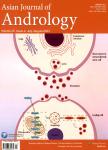The role of peroxisome proliferator-activated receptor gamma in prostate cancer
The role of peroxisome proliferator-activated receptor gamma in prostate cancer作者机构:Department of Medical Oncology City of Hope National Medical Center Duarte CA91010 USA.
出 版 物:《Asian Journal of Andrology》 (亚洲男性学杂志(英文版))
年 卷 期:2018年第20卷第3期
页 面:238-243页
核心收录:
学科分类:0710[理学-生物学] 0821[工学-纺织科学与工程] 071010[理学-生物化学与分子生物学] 081704[工学-应用化学] 07[理学] 08[工学] 0817[工学-化学工程与技术] 082101[工学-纺织工程]
主 题:androgen receptor PPAR gamma prevention prostate cancer warfarin
摘 要:Despite great progress in the detection and treatment of prostate cancer, this disease remains an incredible health and economic burden. Although androgen receptor (AR) signaling plays a key role in the development and progression of prostate cancer, aberrations in other molecular pathways also contribute to the disease, making it essential to identify and develop drugs against novel targets, both for the prevention and treatment of prostate cancer. One promising target is the peroxisome proliferator-activated receptor gamma (PPARy) protein. PPARy was originally thought to act as a tumor suppressor in prostate cells because agonist ligands inhibited the growth of prostate cancer cells; however, additional studies found that PPARy agonists inhibit cell growth independent of PPARy. Furthermore, PPARy expression increases with cancer grade/stage, which would suggest that it is not a tumor suppressor but instead that PPARy activity may play a role in prostate cancer development and/or progression. Indeed, two new studies, taking vastly different, unbiased approaches, have identified PPARy as a target in prostate cancer and suggest that PPARy inhibition might be useful in prostate cancer prevention and treatment. These findings could lead to a new therapeutic weapon in the fight against prostate cancer.



